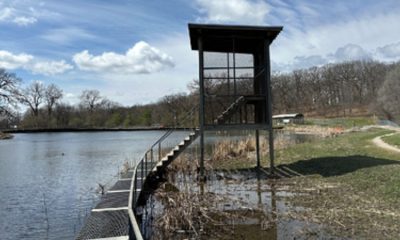Covid-19
Doctors say blood clots appear to be ‘extremely rare’ for Johnson & Johnson vaccine recipients

Doctors are stressing the chance of getting blood clots from the Johnson & Johnson vaccine appears to be very rare.
The U.S. on Tuesday recommended a “pause” in using the single-dose Johnson & Johnson COVID-19 vaccine to investigate reports of rare but potentially dangerous blood clots, a development that could jeopardize the rollout of vaccines around the world.
The Centers for Disease Control and Prevention and the Food and Drug Administration announced that they were investigating unusual clots that occurred 6 to 13 days after vaccination. The FDA commissioner said she expected the pause to last a matter of days.
Dr. Anthony Fauci says Americans who’ve recently received a Johnson & Johnson COVID-19 vaccine shouldn’t be anxious about the “pause.”
The nation’s top infectious disease expert says, “It’s less than one in a million.” Fauci adds people should “pay attention” to symptoms associated with the blood clots, particularly between one and three weeks after the shot.
Doctors with the federal health departments said people who have received the J&J vaccine “who develop severe headache, abdominal pain, leg pain, or shortness of breath within three weeks after vaccination should contact their health care provider.”
According to officials, for those who received the vaccine over a month ago, the risk is very low at this time.
More than 6.8 million doses of the vaccine, which is also known as the Janssen vaccine, have been administered as of Monday in the U.S., according to the CDC.
The Pfizer and Moderna vaccines are not affected. Dr. Geoffrey Barnes, cardiologist and vascular medicine specialist in Michigan, said there has not been a sign of blood clot risk with those vaccines.
“It’s important to note that we do not yet know if there is a real risk of clotting associated with the J&J/Janssen vaccine,” Barnes said on a University of Michigan Health System website. “So far, there are very few reported cases (six) despite millions of doses administered.”
Barnes said it’s wise to be putting the vaccine on pause and that the clots seem to be quite rare.
“The risk of blood clots in patients with COVID is far higher than the very small risk of a blood clot following a COVID-19 vaccine,” Barnes said. “Overall, the benefits of COVID-19 vaccination greatly outweigh the very small risks.”
Barnes said doctors are aware of the condition and have the tools to diagnose and treat patients if it occurs.
Fauci said the pause will help give physicians insight for treating people to know if a treatment should be avoided.
-

 Local News2 weeks ago
Local News2 weeks agoHy-Vee gives the Northeast Iowa Food Bank a donation of over $139,000
-

 Iowa2 weeks ago
Iowa2 weeks agoThe governor of Iowa signs a bill granting the state the power to detain and expel some immigrants
-

 Local News2 weeks ago
Local News2 weeks agoThe fight for LGBTQ rights has not stopped 15 years after the Varnum v. Brien decision by the Iowa Supreme Court
-

 Local News2 weeks ago
Local News2 weeks agoOne-armed Central DeWitt archer getting ready for the nationals
-

 Iowa2 weeks ago
Iowa2 weeks agoA judge blocks the demolition of a groundbreaking Iowa art installation
-

 Local News1 week ago
Local News1 week agoThe annual Special Olympics competition in Iowa creates a sense of community
-

 Iowa6 days ago
Iowa6 days agoLegislators in Iowa enact a bill to improve disability accessibility in state parks
-

 Local News4 days ago
Local News4 days agoThe Mississippi River Bridge in Lansing reopens on Saturday






Leave a Reply